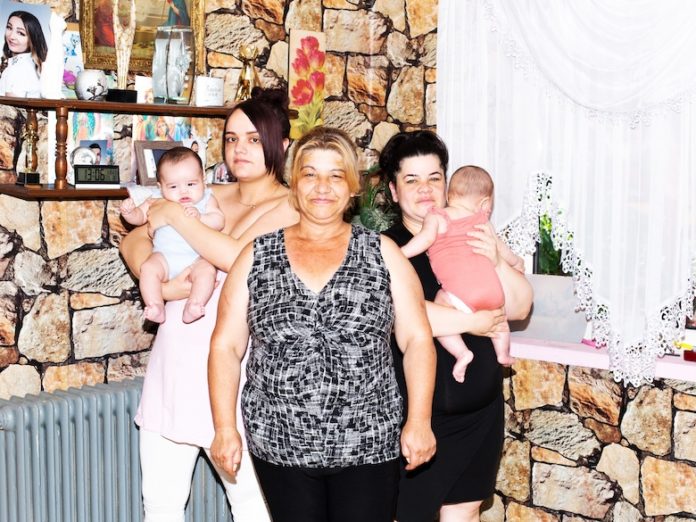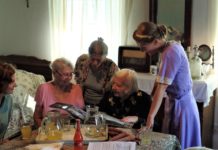The Roma Community Doula Service was initiated in 2019 in Alsózsolca, in northeast Hungary, in response to local women expressing the need for a companion during childbirth to avoid being alone in the institutional care process. The project won the SozialMarie Prize for social innovation last year. Initially, the goal of the doula service was to provide local female companions for pregnant girls and women, ensuring they had someone they knew by their side during a significant period of their lives. Later, the doula service extended its activities to the areas of contraception and abortion. Since 2023, women in vulnerable positions can also receive information on these topics from their community companions.
This program is very important for Roma women because, before it existed, they weren’t very informed and didn’t dare to ask doctors many questions. They went into childbirth just to get through it. Now they dare to ask questions and share information with other women based on what they hear, so it spreads by word of mouth. Childbirth also goes differently now, thank God, because they know there will be a doula beside them, and they can experience their birth in a better way, says Viktória Vadász, community doula.
Due to the lack of information, women’s reproductive rights may be cumulatively violated. Roma women stand out here, as they often do not even have adequate accompaniment during childbirth. To respond to that need the program is available to Roma women who face significant disadvantages and inequalities in accessing and exercising their sexual and reproductive rights. It aims to alleviate these issues by supporting women in situations related to childbirth, contraception, and abortion, building solidarity among local women. We place a strong emphasis on prevention, they point out, encouraging women to make informed decisions about when and how frequently they want to have children.This helps reduce the number of abortions and ensures more desired children are born.
So far, Roma women were afraid of how they would be treated, what would happen to them in gynecological care, or if they would be criticized for their ethnicity, for having so many children, or for wanting more children—this often led to scolding and hurtful words. Now, the positive experience is that women don’t look back on childbirth as something bad or remember being treated poorly or left alone. Instead, they recall how great it was that a doula was there with them, and how that empowered them.
Before, during, and after birth
Before childbirth, we explain to a first-time mother what will happen to her, what to expect at the hospital, and what procedures she will go through in the delivery room. They often ask us to make appointments for them with gynecologists. If they don’t understand what the midwife says, they come to us, and we translate it into simpler terms. We help where we can.
The same applies to medical documents, it is stated further. If a woman doesn’t understand something (e.g., after a nonstress test or ultrasound), the doula reviews the paper with her and reassures her that everything is fine. If a doctor scares her, they figure out together how to seek a second opinion. There’s also a birth plan. The doula writes down the mother’s requests, such as avoiding an episiotomy or wanting to move freely instead of lying on the bed. If a C-section is necessary, they write down the mother’s wish to have a companion present in the operating room.
During labor, our role is primarily to be by the woman’s side. She is the center of our focus, and the doula does what the woman asks for, whether it’s a massage, sitting up, walking, squatting, or breathing together. During pushing, if needed, I support her physically if she asks for help. We also reassure her that if something goes wrong, it’s not her fault. At the end, I tell them: ‘You did this, not me, not the doctors—just you, and you did an amazing job.’
After childbirth, the doula listens to the mother, how she recalls the birth, how she felt, what was the most difficult, and how the doula helped her. If the woman doesn’t want more children, the doula informs her about contraception options, and she can receive the necessary items for free from the health service.
My own experience of giving birth was central to my becoming a doula, so what happened to me wouldn’t happen to others. Reflecting on my youth – I gave birth at 15 – I didn’t know what was going to happen to me in the delivery room, why I couldn’t scream, or why they were pushing on my stomach. Or why they treated me the way they did, why I had to stay silent. If I was a bit loud, they told me to quiet down because it couldn’t hurt that much. I became a doula so the woman can decide, not others, what happens with her own body.
At the start of the program, doulas sought women who needed the service. Then, word spread from one woman to another about how great it was to have a doula with them, and how it empowered them. This gave everyone a push to reach out to a doula themselves. The trusting relationship largely depends on how the doula approaches the woman, with kind words and assurance that she will stay with her throughout the process.
In their professional experience, the discrimination faced by Roma women and the structural shortcomings of healthcare both prevent them from receiving gynecological-obstetrical care that respects their human rights and dignity. It’s also important to remember that not every woman immediately feels the maternal instinct. It’s not always, ‘Here I am, give me my baby, I’m already a great mother.’ After a difficult birth, the mother’s mind may be on how painful it was. In such cases, I take the baby, and when the woman says she’s ready, I give the baby to her. I don’t force it or question her motherhood. I’ve seen many births where, once the woman took the baby on her own terms, both she and the baby calmed down and bonded better.
The resulting negative experiences can significantly impact mother-child bonding, contributing to postnatal depression, which complicates the transition to motherhood and family life. However, when these women are supported and accompanied by Roma community doulas, their sense of security, autonomy, health awareness, and advocacy skills are strengthened, they conclude. This increased confidence enables them to better support their children’s development and ensure a safe family environment.












